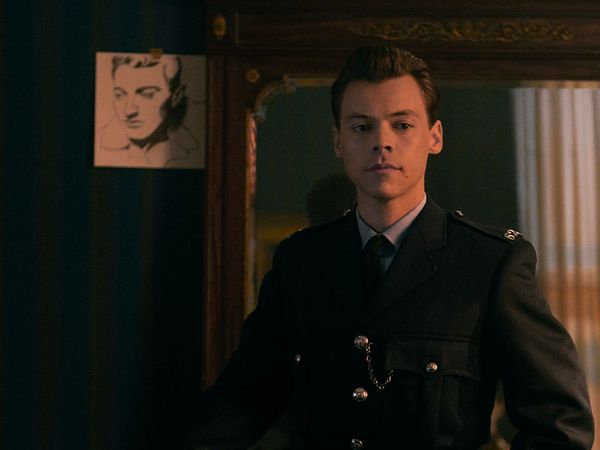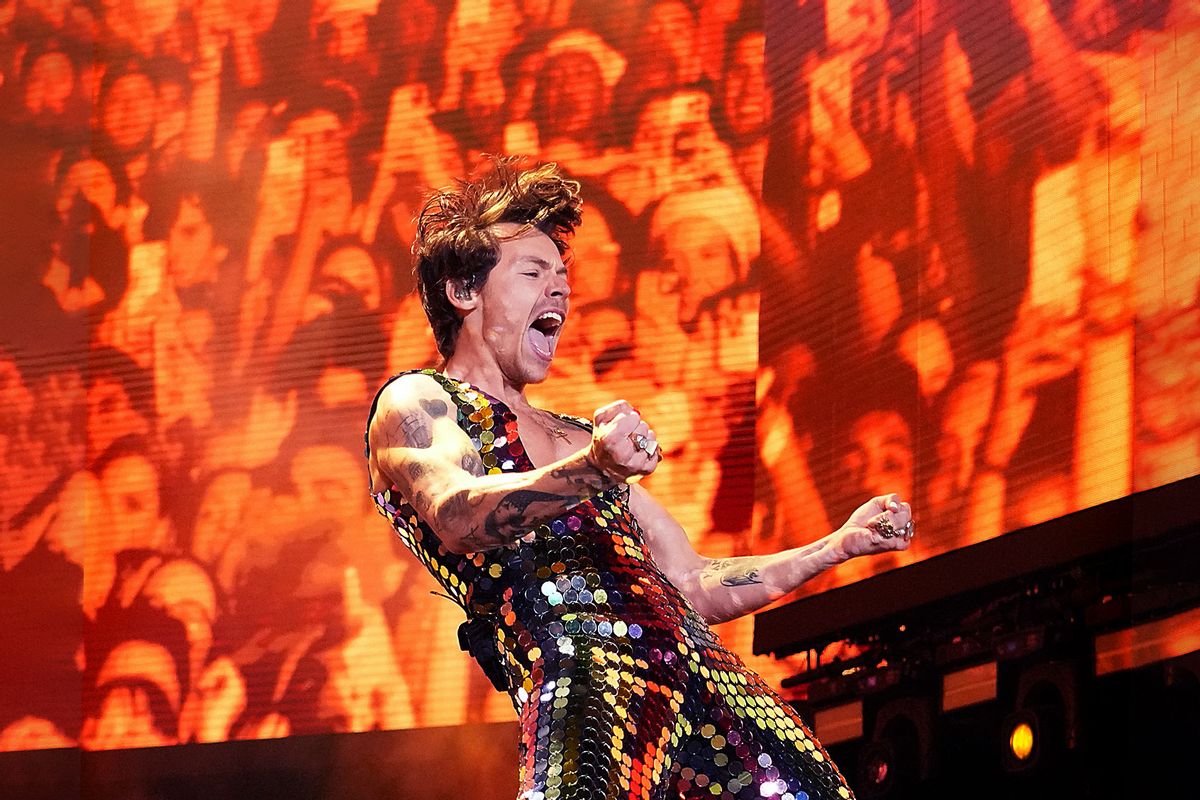None of this would have happened without "Harry's House" ... [which] helped steer his career forward.
When Harry Styles is on tour, his Instagram feed tends to be a colorful array of photos showing off elaborate stage outfits, dramatic poses and cheeky glimpses into his backstage life.
But in mid-December, he posted a more casual black-and-white photo of him in a tracksuit, ostensibly before a show, along with a reflective missive. "2022 changed my life," he wrote. "I can't begin to thank all of you who supported me through it, I'll never forget it. I hope your end of year is filled with happiness and calm. Love you all."
Styles' breakout year was perhaps more a culmination of a whirlwind decade full of life-changing moments — a reflection of his intense ambition and diligent work ethic. The Redditch, Worcestershire, England, native first became a massive superstar in the early 2010s, when he filled stadiums with the effusive pop group One Direction. After the group went on hiatus, Styles went solo and immediately found success with his 2017 self-titled debut. He quickly followed this up with "Fine Line," which recently celebrated its third anniversary, and then this year's "Harry's House."
But Styles' 2022 was so successful, it's hard to pinpoint exactly what was so transformative. Was it that he landed prominent acting roles in the movies "Don't Worry Darling" and "My Policeman"? Was it the 15 concerts he sold out at Madison Square Garden, as part of an ongoing tour that also saw him play 12 nights in Los Angeles and do extended residencies in Chicago and Austin? Or is it that he won Favorite Male Pop Artist and Favorite Pop Song at the American Music Awards, ahead of nabbing six Grammy nominations, including three in the most prestigious categories? How about coming in at No. 2 on Billboard's Greatest Pop Stars of 2022 list?
 Harry Styles in "My Policeman" (Amazon Studios)
Harry Styles in "My Policeman" (Amazon Studios)
Styles is an avowed Elton John fan, and you can hear shades of John's own early-career musical evolution in the eclectic music.
Save for the acting, none of this would have happened without "Harry's House." It can be difficult for pop artists to break the mold of what made them successful — in Styles' case, a mix of upbeat pop bangers, heartfelt anthems and flashy rockers. "Harry's House" more than anything helped steer his career forward, moving him away from the homages to '70s glam and rock (and Fleetwood Mac) in favor of a funkier, soulful and more introspective vibe.
"I think a big part of kinda [the] evolution of what music you make as well is, like, it doesn't matter if people want you to be that thing that they always loved about you or they want you to be that person, because you're not that person anymore," Styles told Apple Music. "Everyone is changing, and I think there's no reason to not approach music that way, and kind of let it change and turn out differently than you started."
More specifically, Styles is an avowed Elton John fan, and you can hear shades of John's own early-career musical evolution in the eclectic music. "Harry's House" starts with a one-two opening punch of the horn-peppered strut "Music For a Sushi Restaurant" and the glittery "Late Night Talking" and extends to the album's guests. Bass legend Pino Palladino contributes to two tracks, including "Daydreaming," which also samples the Brothers Johnson's "Ain't We Funkin' Now," while Ben Harper adds the plaintive and disorienting guitar to the folkish, harmony-heavy "Boyfriends." Dev Hynes, meanwhile, adds cello to "Matilda," reinforcing the song's somber themes.
Lyrically, songs ruminate on past relationships and ephemeral romances, provide sharp character sketches of people trying to find their equilibrium — led by "Matilda," featuring someone dealing with the fallout from a neglectful family — and describe hazy, late nights that provide both emotional clarity and intellectual obfuscation.
Styles launched "Harry's House" with the effervescent "As It Was," which exuded the carefree vibe of summery '80s pop through a modern production lens. Lyrically, however, it was moodier than past singles, acknowledging the quick pace of change and speaking to the power of restlessness. "In this world, it's just us/You know it's not the same as it was."
"It's about metamorphosis and embracing change, and former self and perspective shift, and all of that kind of stuff," he told Audacy. "And it just felt like the thing I wanted to say, and the thing I wanted to be doing, and the kind of music I wanted to make coming back." "As It Was" resonated, entering the charts at No. 1 in both the UK and U.S., and spent 15 weeks atop the Billboard Hot 100. (It also spawned one of the best mash-ups of the year, with a-Ha's "Take On Me.")
Styles' concerts are capital-E Events that encourage fans to don costumes, formalwear, high-fashion — whatever they feel called to wear on a given night.
Live, "Harry's House" also transformed into something else entirely. Styles is known for a buzzing and energetic live presence — a very model of aerobic endurance — who commands a stage alongside his band. "Our job tonight is to entertain you — I promise you we'll do our very best," Styles said before "Grapejuice," in an Apple TV concert that aired the day of "Harry House"'s release. "Your job is to have as much fun as you possibly can. If you want to sing, if you want to dance. Please feel free to do whatever it is you want to do. Please feel free to be whoever it is you've always wanted to be."
That's not just lip service. Styles' concerts are capital-E Events that encourage fans to don costumes, formalwear, high-fashion — whatever they feel called to wear on a given night. There are show rituals — notably line dancing during "Treat People with Kindness" and conga lines — and elevated banter. Styles has helped people come out, overseen baby gender reveals, and made room for marriage proposals. For years, Styles has worn various flags given to him by fans during certain moments of his shows — to name a few, the trans, pride, bisexual and lesbian flags.
Fan rituals are a time-honored tradition that bond people together into permanent friendships, creating what can often feel like a secret language shared by only a few. When you're going through rough times or seeking out your path in life, this aspect of fandom brings solace —something that anchors you and provides meaning.
But this welcoming environment especially speaks to why Styles' music and presence are resonating. He provides an oasis of acceptance, and a come-as-you-are approach that's deeply moving but also deeply important.
Want a daily wrap-up of all the news and commentary Salon has to offer? Subscribe to our morning newsletter, Crash Course.
On the whole, the world at large can feel very unaccepting of differences today. We're living in a time of anti-LGBTQ legislation and sentiment that's led to book banning, nasty protests and gun violence and a time experiencing a sharp rise in antisemitism. We're dealing with the misogyny, oppression and health challenges that go hand in hand with the overturn of Roe v. Wade, and having conversations about the ways racism and discrimination steer the country's power dynamics. Ableism is still rampant.
In light of this, it's radical to say "treat people with kindness" (as Styles does in a signature tune) and encourage a space for unconditional acceptance, empathy and understanding. It's not tacit approval — but loud, proud and galvanizing approval. Both live and on record, "Harry's House" offers a window into what Styles has been through, but also serves as an invitation to embrace a lifestyle that's more open and vulnerable. It's clear Styles hit on something profound and successful in 2022 by following his own advice — it's exciting to imagine where this might take him in the future.



Shares